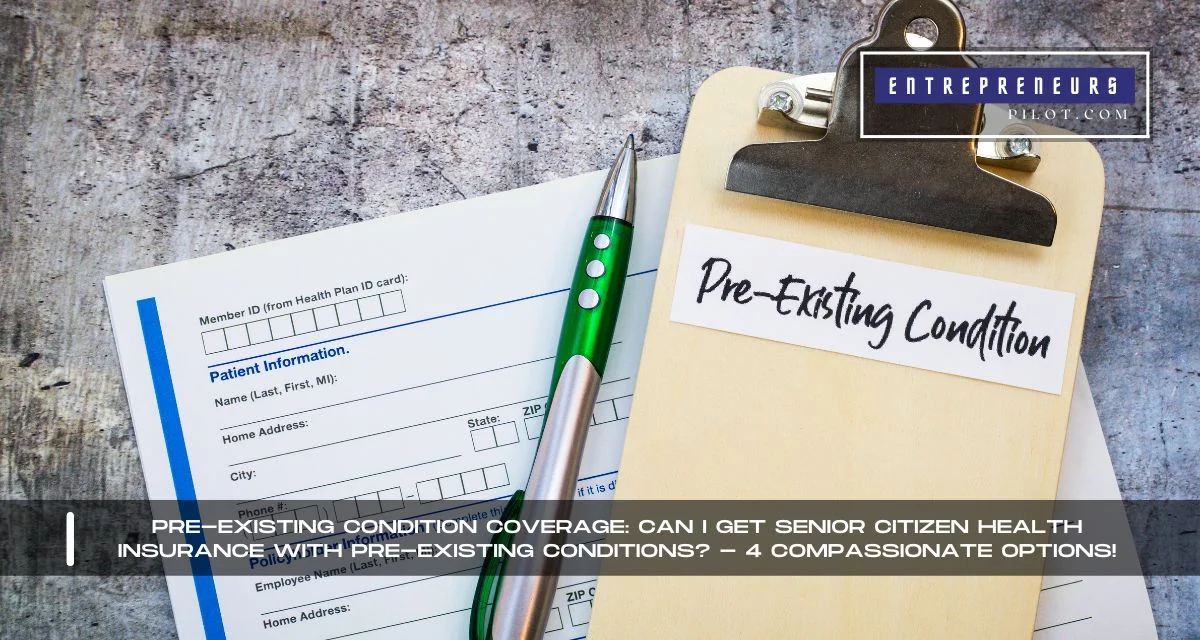Introduction
Navigating the health insurance landscape can be daunting, especially for seniors grappling with pre-existing conditions. The question is, Can I Get Senior Citizen Health Insurance With Pre-Existing Conditions? echoes in the minds of many, stirring concerns about the future. But fear not! This article sheds light on four compassionate options that provide a beacon of hope. We’ll guide you through the intricacies of securing coverage that acknowledges your health history while safeguarding your well-being. So, let’s embark on this journey together, uncovering solutions that affirm life’s golden years can indeed be golden, even with pre-existing conditions.
Table of Contents
Understanding Pre-Existing Condition Coverage
Pre-existing conditions—words that often cast a shadow over the quest for health insurance, particularly for seniors. In essence, these are health issues diagnosed before the initiation of a new health policy. Insurers have traditionally viewed these conditions as high-risk, potentially leading to hesitancy in providing coverage or imposing higher premiums. However, the landscape is changing, with more compassionate options emerging for seniors.
- For Expert Financial Insights And Guidance, You Can Visit Our Sister Site – ArabsGeek.com Now!
- Curiosity Piqued? Dive Into the Most Captivating Financial Content by Visiting Our Homepage!
- Unlock Exclusive Business Opportunities! 🚀 Connect with Us Now at our Email: [email protected]!
The Shift in the Insurance Landscape
In recent years, there’s been a paradigm shift, fueled by legal reforms and a growing recognition of the rights of seniors to accessible, affordable healthcare. Insurance providers are increasingly offering plans designed to cater to individuals with a history of health issues. These plans reflect an understanding that everyone deserves comprehensive healthcare, regardless of their past medical history.
4 Compassionate Options for Coverage
1. Medicare Advantage Plans
Medicare Advantage (Part C) plans are an appealing option for seniors seeking insurance with pre-existing conditions. Unlike traditional Medicare, these plans are offered by private insurance companies approved by Medicare and often include benefits beyond original Medicare, such as prescription drug coverage, vision, and dental care. Most importantly, you cannot be denied coverage based on health conditions, making it a solid choice for those with pre-existing conditions.
2. Medigap Policies
Medigap, or Medicare Supplement Insurance, works alongside your original Medicare coverage to fill the “gaps” in coverage, such as deductibles, copayments, and coinsurance. While these policies are standardized, they offer the flexibility to choose a plan that best suits your needs, including coverage for pre-existing conditions. It’s important to enroll during the Medigap open enrollment period for the most comprehensive benefits.
3. Medicaid
For seniors with limited income and resources, Medicaid presents a vital lifeline. This state and federally funded program offers extensive health coverage, including for individuals with pre-existing conditions. Eligibility criteria vary by state, but Medicaid is designed to ensure that the most vulnerable, including seniors with health issues, receive the care they need.
4. Employer or Union Plans
Retirees who had health insurance through their employer or union may have the option to continue this coverage into retirement. These plans often provide comprehensive coverage and may not impose exclusions based on pre-existing conditions. It’s worth exploring whether this option is available and affordable based on your retirement benefits.
Navigating Your Options
Choosing the right health insurance involves careful consideration of your health needs, financial situation, and the coverage options available. Here are some tips to help you navigate this process:
- Research Thoroughly: Understand the specifics of each plan, including coverage limits, out-of-pocket costs, and eligibility criteria.
- Consult Professionals: Insurance agents, brokers, or healthcare advisors can provide personalized advice based on your circumstances.
- Consider Your Health Needs: Prioritize plans that offer the best coverage for your specific health conditions and treatments.
- Review Annually: Health insurance needs can change. Regularly review your coverage and explore new options during open enrollment periods.
Conclusion | Can I Get Senior Citizen Health Insurance With Pre-Existing Conditions
The journey to find senior citizen health insurance with pre-existing conditions may seem fraught with obstacles, but there are compassionate options available that offer hope and security. By exploring Medicare Advantage plans, Medigap policies, Medicaid, and employer or union plans, seniors can find coverage that meets their health and financial needs. Remember, your health history should not deter you from accessing the care you deserve. With the right approach and resources, securing health insurance that embraces your pre-existing conditions is not only possible but achievable.
Frequently Asked Questions
Can I be denied coverage because of a pre-existing condition?
Under current laws, Medicare and Medicaid cannot deny you coverage because of pre-existing conditions. Private insurers also offer plans specifically designed for individuals with health issues, thanks to healthcare reforms.
What is the best time to apply for Medigap if I have a pre-existing condition?
The best time to apply for a Medigap policy is during your Medigap open enrollment period, which begins on the first day of the month in which you’re both 65 or older and enrolled in Medicare Part B. During this period, you can’t be denied a policy or charged more due to pre-existing conditions.
Are there any health insurance options for seniors who cannot afford Medicare?
Yes, Medicaid is an option for low-income seniors and can provide comprehensive coverage, including for those with pre-existing conditions. Additionally, there are state and federal programs available to help with Medicare premiums and out-of-pocket costs for those who qualify.
How do Medicare Advantage plans handle pre-existing conditions?
Medicare Advantage plans must cover all the services that original Medicare covers, and they cannot deny coverage or charge higher premiums based on health status or pre-existing conditions, except for end-stage renal disease (ESRD), which has specific rules.
Can I switch from Medicare Advantage to Medigap if I have a pre-existing condition?
Yes, you can switch from Medicare Advantage to Medigap during specific enrollment periods. However, outside of your initial enrollment period, you may be subject to medical underwriting for Medigap, which could affect your premiums or coverage options based on your health history.











